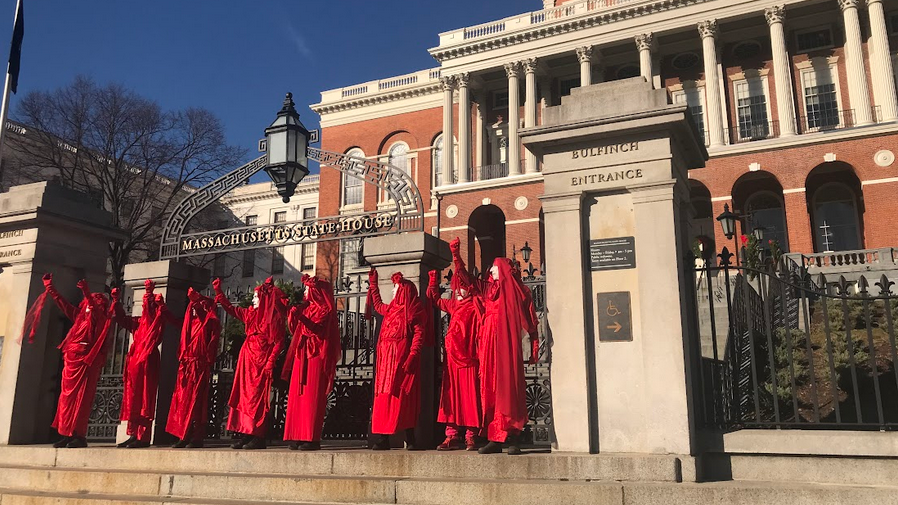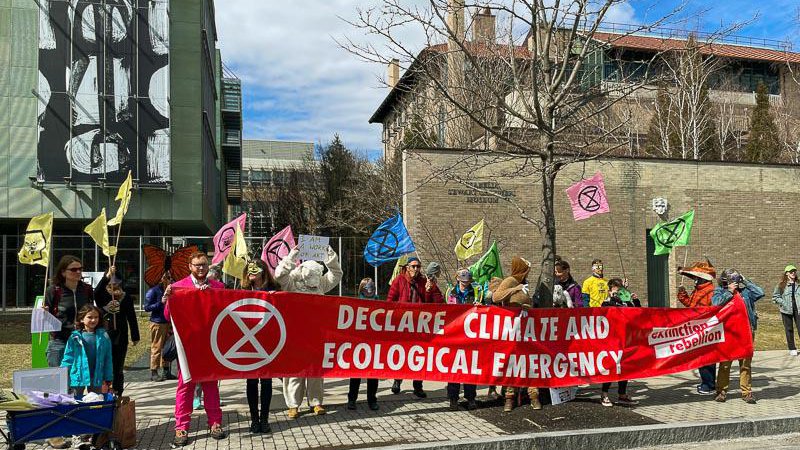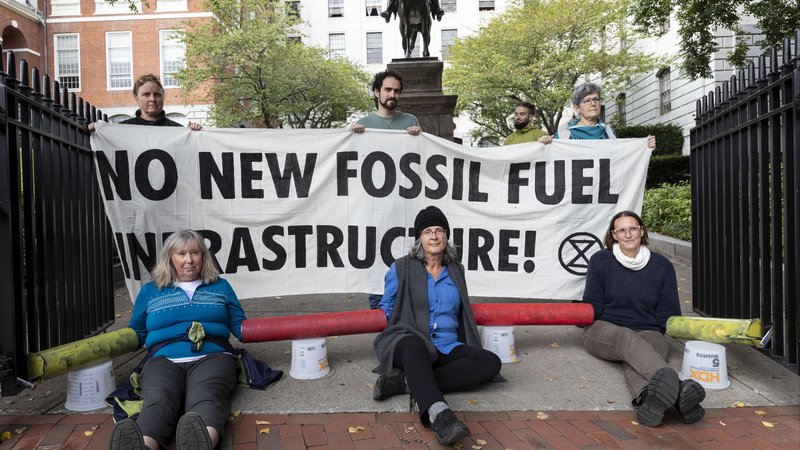
Trump's Cabinet Appointees: What Do They Mean for the Climate Crisis?
It's been a whirlwind few weeks in the United States, and we hope you're holding up. Before we get into the news, please consider joining an online Climate Grief Circle. It's a safe space to process whatever emotions you're feeling now: Anger, fear, sadness, confusion, or numbness - everything is welcome and everyone has a place. Because it's an online circle, you can attend from anywhere. We hope to see you there.
Let's get into it. Trump's presidential victory was announced in the early hours of Wednesday November 6. The New York Times reported on Friday November 8 that Trump's transition team had already prepared executive orders and proclamations on withdrawing from the Paris climate agreement. This signaled that Trump intends to waste no time.
Environmental Protection Agency: Lee Zeldin
On Monday November 11, as the COP conference began in Azerbaijan, Trump chose former New York Congressman Lee Zeldin to head the Environmental Protection Agency. Trump announced of Zeldin, "He will ensure fair and swift deregulatory decisions that will be enacted in a way to unleash the power of American businesses." Trump also boasted that Zeldin will at the same time maintain "the highest environmental standards, including the cleanest air and water on the planet." However, as a congressman Zeldin voted against Biden's climate change law and the Inflation Reduction Act. He also rejected legislation cracking down on price gouging by oil companies.
As summarized by UCLA's environmental law expert Ann Carlson, “The oddest thing about Trump appointing Zeldin to oversee the EPA is that he doesn’t have any experience with the bureaucracy or the industries that the EPA regulates. That’s the opposite of the first Trump administration, when Trump’s two picks were a coal-industry lobbyist and a former attorney general who led Republican state lawsuits against strong environmental regulations."
Carlson continues, “In these Cabinet appointments, loyalty seems to be a bigger priority than experience or expertise. As far as I can tell, anyone who has expressed any concern over any of Trump’s policies, or the January 6 attack, or Trump himself, are disqualified from serving. That takes away a lot of potential talent that might be deployed to enact Trump’s agenda.”
Carlson does offer some small hope about the EPA appointment: “Rolling back President Biden’s climate rules, as Trump has promised, cannot be done with just a snap of the fingers. There are laws and procedures that have to be followed. The Clean Air Act requires the EPA to regulate greenhouse gases because the EPA has found that greenhouse gases endanger public health and welfare. You can’t just refuse to regulate. And you have to follow legal processes to repeal and replace regulations: You have to give notice to the public and time for public comment, present evidence justifying the changes, complete a cost-benefit analysis — things that are cumbersome and complex. Having an administrator with no experience with environmental issues is risky. The first Trump administration found out that you can’t just have your way without following law or process. Nearly 85% of their efforts to roll back environmental regulations were struck down in court.”
Energy Secretary: Chris Wright
As reported on November 16, Trump has selected Chris Wright, a campaign donor and fossil fuel executive, to serve as energy secretary. The New York Times calls Wright, "a TV-ready evangelist for fossil fuels who lacks government experience." Wright is the CEO of Liberty Energy, based in Denver Colorado, and he is a vocal advocate of oil and gas development, including fracking, a key pillar of Trump’s quest to achieve U.S. “energy dominance” in the global market.
According to reporting by CBS, "Wright has been one of the industry’s loudest voices against efforts to fight climate change and could give fossil fuels a boost." In a video posted on LinkedIn last year, Mr. Wright declared, “There is no climate crisis, and we’re not in the midst of an energy transition either.” Not surprisingly, he is a vocal detractor against the global climate movement, and has been quoted saying it is “collapsing under its own weight.”
Wright's selection was loudly supported by influential conservatives, including oil and gas tycoon Harold Hamm. Hamm helped organize an event at Trump’s Mar-a-Lago resort in April where Trump reportedly asked industry leaders and lobbyists to donate $1 billion to Trump’s campaign, with the expectation that Trump would curtail environmental regulations if re-elected. Thomas Pyle, president of the American Energy Alliance, a conservative group that supports fossil fuels, said Wright would be “an excellent choice” for Energy secretary.
According to the New York Times, Mr. Wright is expected to swiftly end a Biden administration pause on new liquefied natural gas export terminals. A judge blocked the pause and the Biden administration did approve at least one export permit, but Republicans and the oil and gas industry have accused the administration of deliberately stalling new approvals.
Interior Secretary: Doug Burgum
Governor Doug Burgum of North Dakota has been tapped to run the Interior Department, leading the new administration’s plans to open federal lands and waters to oil and gas drilling. Not surprisingly, Burgum has longstanding ties to fossil fuel companies and acted as a liaison between the Trump campaign and the oil executives who have donated heavily to it.
The Interior Department manages about 500 million acres of public lands and vast coastal waters. Its agencies lease many of those acres for oil and gas drilling as well as wind and solar farms. It oversees the country’s national parks and wildlife refuges, protects threatened and endangered species, reclaims abandoned mine sites, oversees the government’s relationship with the nation’s 574 federally recognized tribes, and provides scientific data about the effects of climate change.
As reported in the New York Times, "Mr. Trump is counting on using that land to 'drill, drill, drill,' something he said would cut energy bills in half. We’re going to do things with energy and with land that’s going to be incredible,' he said."
Kierán Suckling, executive director at the Center for Biological Diversity says, "Burgum will be a disastrous secretary of the interior who’ll sacrifice our public lands and endangered wildlife on the altar of the fossil fuel industry’s profits."
The New York Times also reported, "Mr. Burgum was not always a champion for the oil industry. When he ran for governor in 2016, he criticized his rival for accepting donations from oil and gas companies and over the industry’s political influence. After winning the Republican primary, however, Mr. Burgum accepted the financial and political support of oil and gas companies in a state where the economy is heavily tied to those fuels."
As Governor, Mr. Burgum has almost completely avoided the phrase "Climate change." However, in 2021, he set an ambitious goal for North Dakota to stop adding carbon dioxide to the atmosphere by 2030, and he signed legislation in 2017 to create the state’s first Department of Environmental Quality.

What do these appointees mean for the climate crisis?
As reported by PBS, “President-elect Trump said he wants to get rid of virtually all of the Biden administration's climate change regulations intended to cut carbon emissions and to move away from fossil fuels. He's also called for the repeal of the Inflation Reduction Act, President Biden's signature climate law.”
These cabinet appointees seem uniquely selected to support Trump in this quest, especially since they deny the reality of the climate crisis across the board. They seem united in their commitment to expand the fossil fuel industry and trade environmental quality for capitalistic gains. Meanwhile, October 2024 was the fifteenth month in a 16-month period where the average temperature was at least 2.7 degrees above the pre-industrial levels (1850-1900). 2 degrees F is considered the critical threshold. This means we're already reaching a 35% increase over the critical threshold.
We need to expect that these cabinet appointees will do everything in their power to dismantle the regulations that keep our future safe, and we need to fight back.
How can we respond?
The American climate movement's opportunity now is for statewide action, and statewide action can have a large impact in fossil fuels infrastructure and protected lands. Without federal support for climate, our state leaders' decisions on energy and the environment are more crucial than ever, and demanding they ban new fossil fuel infrastructure is a necessary first step. The best thing we can do is build a mass climate movement. If you're interested in taking non-violent direct action, we recommend that you participate in an upcoming Non-Violent Direct Action Training.
Related Stories:
Featured:
-
The third annual Week of Rebellion is full of opportunities for celebration and action!
-
Our government had the opportunity to finally turn our state into a "climate leader," and they decided yet again to prioritize profits and political posturing over the well-being of residents.
-
Prominent climate scientists and activists demand immediate climate action in the United States.
-
Stop the Fossil Fuel Industry, Now: List of events for Extinction Rebellion Boston's September week of rebellion
-
A compilation of books, movies, articles, and ways to take action to protect Black lives
-
Nadia Colburn, PhD and member of Extinction Rebellion Media team, discusses how to talk about the climate and ecological crisis with family and friends.
Upcoming Events:
-
Wed Jul 2nd @ 6 p.m.
-
Thu Jul 3rd @ 10 a.m.
-
Mon Jul 7th @ 6:30 p.m.
